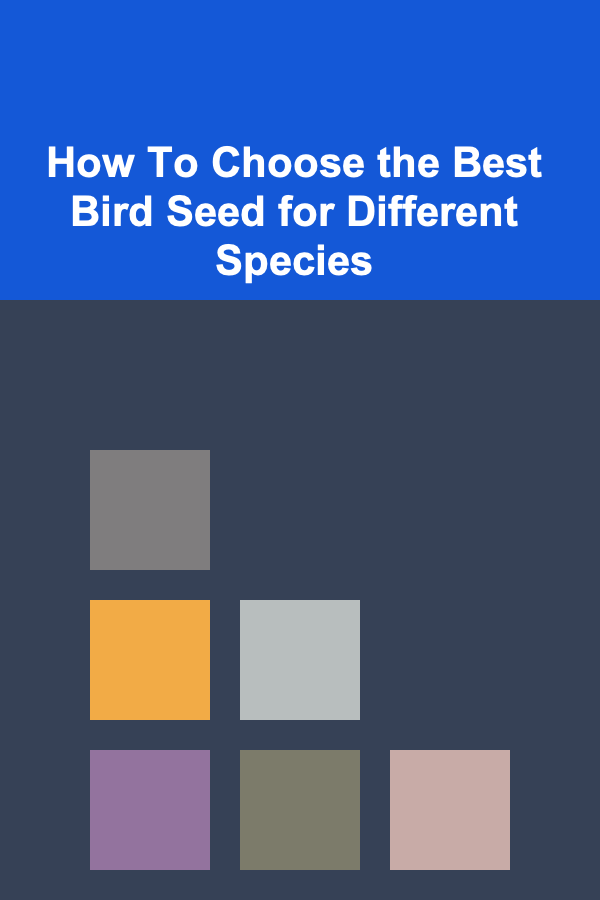
How To Choose the Best Bird Seed for Different Species
ebook include PDF & Audio bundle (Micro Guide)
$12.99$10.99
Limited Time Offer! Order within the next:

Birdwatching is an enjoyable and educational hobby that many people around the world participate in. Whether you have a small backyard bird feeder or you manage a full-fledged bird sanctuary, choosing the right bird seed is essential to attracting a variety of species and ensuring their health and well-being. The world of bird seed can be vast and confusing, but with a little understanding of bird dietary needs and the specific types of seeds that suit each species, you can ensure your feathered friends receive the proper nutrition.
In this article, we'll explore the different types of bird seed available, how to select the best one for various bird species, and how to create a bird-friendly environment that supports avian health.
Understanding Bird Diets
Before we dive into the specifics of bird seed, it's important to understand the basics of bird diets. Birds, like all creatures, require a balanced diet to thrive. Their nutritional needs vary depending on their species, size, habitat, and even the season. There are three major categories of food that wild birds eat:
- Seeds and Grains: These are a natural source of carbohydrates and fats, essential for energy and survival.
- Nectar: Many birds, especially hummingbirds, depend on nectar as a primary food source.
- Insects and Worms: Insects provide essential protein, vitamins, and minerals for many species.
Birds may also consume berries, fruits, and even small animals depending on their species. However, seeds tend to be the most commonly offered food in bird feeders, so it's vital to know what kind of seed is most beneficial for the birds you wish to attract.
Types of Bird Seed
Bird seed comes in a wide variety of options, each catering to specific bird species. These seeds differ in size, nutritional content, and how they are consumed. Here are some of the most common types:
1. Black Oil Sunflower Seeds
These are among the most popular seeds for a variety of birds. They are high in fat, making them an excellent energy source. Black oil sunflower seeds have thin shells, which makes them easier for many species to crack open, and they're attractive to a wide range of birds, including finches, chickadees, nuthatches, and woodpeckers.
Best For:
- Cardinals
- Finches
- Chickadees
- Grosbeaks
- Woodpeckers
2. Striped Sunflower Seeds
These seeds are larger than black oil sunflower seeds and have a thicker shell. While some birds, like woodpeckers, can crack open these seeds, they're generally less accessible than black oil sunflower seeds. Striped sunflower seeds are a good option for large birds with stronger beaks, such as jays and crows.
Best For:
- Jays
- Crows
- Larger finches
3. Nyjer Seed (Thistle Seed)
Nyjer seed is small and high in oil content, making it a favorite of small finches like the American Goldfinch and Pine Siskin. Nyjer is often offered in specialized tube feeders with small holes that prevent other birds from accessing the seed. It's an excellent choice for attracting smaller birds that have specific dietary needs.
Best For:
- American Goldfinches
- Pine Siskins
- Redpolls
- Chickadees
4. Millet
Millet is a small, round seed often used in mixed seed blends. While it's not as high in fat or protein as sunflower seeds, it's still a good option for attracting a variety of ground-feeding birds. Birds like sparrows, juncos, and doves enjoy millet, and it can be sprinkled on the ground or served in feeders with larger openings.
Best For:
- Sparrows
- Juncos
- Doves
- Pigeons
5. Safflower Seeds
Safflower seeds are slightly bitter and are often used to deter squirrels and other animals from bird feeders. These seeds are rich in oil and protein and are a favorite of cardinals, grosbeaks, and other larger birds. Safflower is a great alternative to sunflower seeds for attracting specific species while avoiding nuisance animals.
Best For:
- Cardinals
- Grosbeaks
- Doves
6. Peanuts
Peanuts, particularly in the shell or roasted, provide a high protein content that many birds find appealing. While peanuts are often a favorite of jays and woodpeckers, they're also enjoyed by larger birds like crows and chickadees. Peanuts should be offered in moderation due to their high fat content.
Best For:
- Jays
- Woodpeckers
- Chickadees
- Crows
7. Suet
Suet is a high-fat food typically made from animal fats, and it's used to feed birds during colder months when they need more energy. It's especially useful for attracting woodpeckers, nuthatches, and other insect-eating birds. Suet can come in a variety of forms, such as cakes, balls, or mixed with seeds and fruit.
Best For:
- Woodpeckers
- Nuthatches
- Chickadees
- Titmice
8. Corn
Whole or cracked corn is a less common option but can be useful for attracting larger birds like pigeons, quails, and doves. Corn should be provided sparingly since it's not as nutritionally dense as other seeds, but it's a great option for ground-feeding birds.
Best For:
- Pigeons
- Doves
- Quails
Choosing the Best Seed for Specific Bird Species
Now that we've covered the most common types of bird seed, it's time to look at how to choose the best seed for different bird species. Each bird species has unique dietary needs based on their size, beak structure, and natural habitat.
1. Songbirds
Small songbirds like sparrows, finches, and chickadees typically enjoy seeds that are high in fat and easy to crack open. Black oil sunflower seeds and Nyjer seed are top choices for these species. Songbirds also appreciate suet, especially during the colder months.
Recommended Seeds for Songbirds:
- Black oil sunflower seeds
- Nyjer seed
- Millet
- Suet (especially during the winter)
2. Woodpeckers
Woodpeckers are primarily insectivorous but will readily eat seeds like sunflower seeds, peanuts, and suet. They have strong beaks capable of cracking open tougher seeds and can easily extract peanuts from their shells. Suet is a particularly good option for woodpeckers, as it mimics the insects they typically feed on.
Recommended Seeds for Woodpeckers:
- Striped sunflower seeds
- Peanuts
- Suet
- Corn (if available in the area)
3. Doves and Pigeons
These ground-feeding birds prefer small, round seeds that are easy to find and eat. Millet, cracked corn, and safflower seeds are excellent choices for doves and pigeons. They may also feed on other small seeds like sesame and can be attracted with seed mixes designed for ground feeders.
Recommended Seeds for Doves and Pigeons:
- Millet
- Cracked corn
- Safflower seeds
4. Hummingbirds
Hummingbirds don't eat seeds, but instead feed primarily on nectar. They are attracted to brightly colored flowers or artificial nectar feeders. However, if you want to support hummingbirds in your yard, consider planting native flowering plants or setting up a hummingbird feeder with nectar made from sugar water.
Recommended Food for Hummingbirds:
- Nectar (sugar water, 1 part sugar to 4 parts water)
- Natural flowering plants like bee balm, trumpet vine, and columbine
5. Larger Birds (Crows, Jays)
Large birds such as crows and jays need food that is rich in protein and fat to sustain their energy levels. They will often go for larger seeds like striped sunflower seeds, peanuts, and even fruit. Offering a variety of seeds and other foods like fruit and nuts can help attract these birds to your feeder.
Recommended Seeds for Large Birds:
- Striped sunflower seeds
- Peanuts
- Suet
- Dried fruit (like raisins)
Creating a Bird-Friendly Environment
While selecting the right bird seed is essential, providing a bird-friendly environment is equally important. Here are some tips to make your space even more attractive to birds:
1. Provide Fresh Water
Birds need access to clean, fresh water for drinking and bathing. Place a bird bath or shallow dish of water in your yard, and make sure to change the water frequently, especially during hot weather or freezing conditions.
2. Offer a Variety of Food
Different bird species have different preferences when it comes to food. Offering a variety of seeds, suet, and other foods will attract a wide range of birds to your feeders.
3. Create Shelter
Planting trees, shrubs, and vines can provide birds with natural shelter from predators and harsh weather. Birdhouses and nesting boxes can also provide safe spaces for birds to build nests.
4. Minimize Hazards
Keep your bird feeders away from areas that may pose a danger, such as near windows or areas with heavy foot traffic. Additionally, placing feeders in areas where squirrels and other predators cannot easily access them will help protect the birds.
Conclusion
Choosing the best bird seed for different species can seem like a complicated task, but by understanding the dietary needs of the birds you wish to attract, you can provide them with the best nutrition possible. By offering a variety of high-quality seeds and creating a safe, welcoming environment, you can help support bird populations and enjoy the beauty of birds in your backyard.
Ultimately, birdwatching is not just about seeing beautiful birds---it's about creating an environment that supports their health and well-being. Whether you're interested in attracting songbirds, woodpeckers, or larger birds like jays, the right choice of bird seed can make all the difference in ensuring that your feathered visitors stay happy and healthy.

How To Build a Simple CRUD Application
Read More
How to Organize Your Home to Create More Usable Space
Read More
How to Set Up a Comfortable Sleeping Area for Your Pet
Read More
Improving Warehouse Efficiency: Techniques and Innovations for Modern Warehouse Managers
Read More
How To Sketch Vehicles and Transportation
Read More
How to Ace Your Healthcare Administrator Interview
Read MoreOther Products

How To Build a Simple CRUD Application
Read More
How to Organize Your Home to Create More Usable Space
Read More
How to Set Up a Comfortable Sleeping Area for Your Pet
Read More
Improving Warehouse Efficiency: Techniques and Innovations for Modern Warehouse Managers
Read More
How To Sketch Vehicles and Transportation
Read More